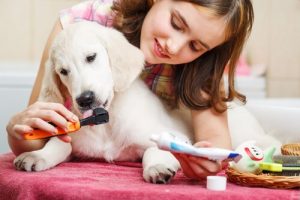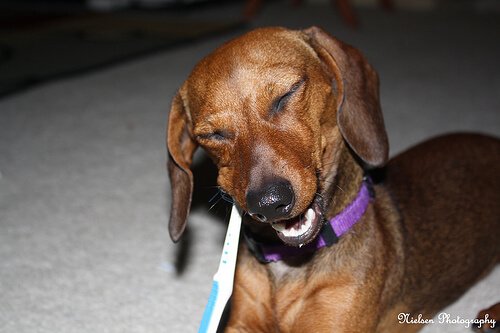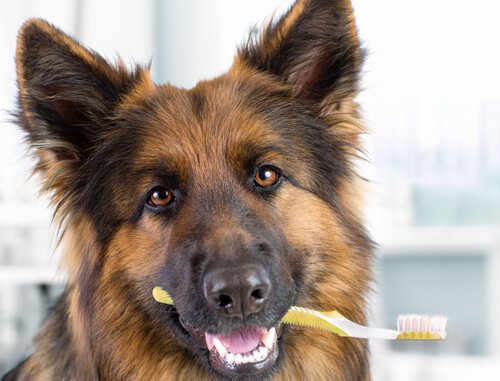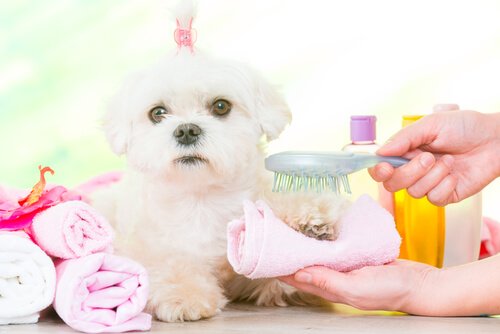What's the Best Toothpaste for Dogs?


Written and verified by the lawyer Francisco María García
Taking care of your pet’s teeth is very important. Good oral hygiene will prevent more complicated problems later on. That’s why it’s good to brush your dog’s teeth on daily basis with toothpaste for dogs.
In addition to keeping your dog’s breath fresh, toothpaste for dogs helps preserve your his dental health. Constant brushing will diminish the buildup of tartar, which will turn into plaque if left long-term.
Periodontal problems become more common when dogs become adults. This can be due to poor dental care during their youth. Just like humans, caring for these animals’ teeth should be a daily habit.
Why use toothpaste for dogs?
Combined with the friction generated by brushing, toothpaste helps scrape residual food from your dog’s teeth. When this residue is left on your dog’s teeth, it builds up and turns into plaque, a whitish substance over the teeth.

Tartar builds when the bacteria in the mouth builds up into plaque and hardens. In some cases, professional intervention is needed to remove plaque. Plaque formation can cause more serious medical complications. For example, gingivitis or swelling of the gums. This dental disease can cause your dog to lose teeth if left untreated.
Sensitivity in the teeth or gums is another sign of poor dental hygiene. The best way to treat dental diseases is by visiting a specialist. After receiving a diagnosis, the vet can start your dog on the most effective treatment.
How to clean your dog’s teeth
You should gradually introduce dental care habits into your pet’s routines. Your dog might have a bad reaction if you brush his teeth aggressively or suddenly. In the beginning, your dog will likely seem uncomfortable and resistant to dental care. As the owner, it’s up to you to keep at it until your dog gets more used to having his teeth brushed.

In order to make dental hygiene into a daily habit, you should follow these tips below:
- Use the right toothbrush: Don’t use a human toothbrush! Some specialists suggest using your index finger to apply the toothpaste when you’re starting out, then later moving on to using a doggy toothbrush.
- Another way to get the animal used to getting his teethed brushed is by covering the brush head. This will minimize the sensation of the brush and allow you to reach further into the mouth.
- Use toothpaste for dogs, not toothpaste for humans: Never use human (even kid’s toothpaste) dental products on your dogs. Unlike humans, your dog can’t spit, and they will swallow the substance.
- Toothpaste for dogs is designed so dogs can swallow it without getting harmed: Additionally, it contains specific enzymes that help control the proliferation of bacteria in your dog’s teeth.
- Build up hygiene habits: Just like with humans, dogs need to get used to having their teeth brushed at the same time on a daily basis. If you can’t do it every day, then you should do it at least once or twice a week.
- Regular vet check-ups: When you go to the vet’s office, get your dog’s teeth checked by a professional. This will be the perfect time to clarify any questions you have about his dental care. The vet can correct your brushing techniques and recommend what toothpaste is best for dogs.

Other options
In addition to the toothpaste that’s sold in stores, you can make homemade toothpaste for dogs. The base of this formula is sodium bicarbonate, mixed with other food ingredients. Depending on your pet’s own taste, he might like a homemade version better. There are formulas with chicken broth, beer, and coconut, though the most basic mix is sodium bicarbonate and water.
When it comes to adult dogs, there are chewable products that will improve your dog’s dental health. These snacks improve his breath and eliminate food residue and plaque. However, these products are not substitutes for brushing. For healthy teeth, your pet still needs dog toothpaste and brushing.
Taking care of your pet’s teeth is very important. Good oral hygiene will prevent more complicated problems later on. That’s why it’s good to brush your dog’s teeth on daily basis with toothpaste for dogs.
In addition to keeping your dog’s breath fresh, toothpaste for dogs helps preserve your his dental health. Constant brushing will diminish the buildup of tartar, which will turn into plaque if left long-term.
Periodontal problems become more common when dogs become adults. This can be due to poor dental care during their youth. Just like humans, caring for these animals’ teeth should be a daily habit.
Why use toothpaste for dogs?
Combined with the friction generated by brushing, toothpaste helps scrape residual food from your dog’s teeth. When this residue is left on your dog’s teeth, it builds up and turns into plaque, a whitish substance over the teeth.

Tartar builds when the bacteria in the mouth builds up into plaque and hardens. In some cases, professional intervention is needed to remove plaque. Plaque formation can cause more serious medical complications. For example, gingivitis or swelling of the gums. This dental disease can cause your dog to lose teeth if left untreated.
Sensitivity in the teeth or gums is another sign of poor dental hygiene. The best way to treat dental diseases is by visiting a specialist. After receiving a diagnosis, the vet can start your dog on the most effective treatment.
How to clean your dog’s teeth
You should gradually introduce dental care habits into your pet’s routines. Your dog might have a bad reaction if you brush his teeth aggressively or suddenly. In the beginning, your dog will likely seem uncomfortable and resistant to dental care. As the owner, it’s up to you to keep at it until your dog gets more used to having his teeth brushed.

In order to make dental hygiene into a daily habit, you should follow these tips below:
- Use the right toothbrush: Don’t use a human toothbrush! Some specialists suggest using your index finger to apply the toothpaste when you’re starting out, then later moving on to using a doggy toothbrush.
- Another way to get the animal used to getting his teethed brushed is by covering the brush head. This will minimize the sensation of the brush and allow you to reach further into the mouth.
- Use toothpaste for dogs, not toothpaste for humans: Never use human (even kid’s toothpaste) dental products on your dogs. Unlike humans, your dog can’t spit, and they will swallow the substance.
- Toothpaste for dogs is designed so dogs can swallow it without getting harmed: Additionally, it contains specific enzymes that help control the proliferation of bacteria in your dog’s teeth.
- Build up hygiene habits: Just like with humans, dogs need to get used to having their teeth brushed at the same time on a daily basis. If you can’t do it every day, then you should do it at least once or twice a week.
- Regular vet check-ups: When you go to the vet’s office, get your dog’s teeth checked by a professional. This will be the perfect time to clarify any questions you have about his dental care. The vet can correct your brushing techniques and recommend what toothpaste is best for dogs.

Other options
In addition to the toothpaste that’s sold in stores, you can make homemade toothpaste for dogs. The base of this formula is sodium bicarbonate, mixed with other food ingredients. Depending on your pet’s own taste, he might like a homemade version better. There are formulas with chicken broth, beer, and coconut, though the most basic mix is sodium bicarbonate and water.
When it comes to adult dogs, there are chewable products that will improve your dog’s dental health. These snacks improve his breath and eliminate food residue and plaque. However, these products are not substitutes for brushing. For healthy teeth, your pet still needs dog toothpaste and brushing.
This text is provided for informational purposes only and does not replace consultation with a professional. If in doubt, consult your specialist.








